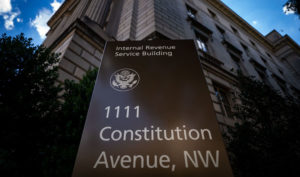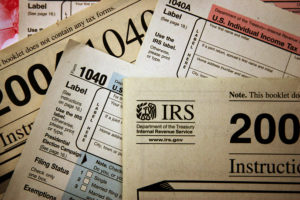
Researchers insist that tax return preparers should be required to demonstrate competency.
When people hire an attorney to represent them, they have a guarantee that their attorney passed a bar exam and completes additional legal education every year. But when people hire a tax return preparer, they have no guarantee that the preparer passed any exam, continues to complete ongoing education, or meets any other minimum standard that qualifies them to prepare taxes.
In a recent paper, Rutgers University Professor Jay A. Soled and University of North Carolina School of Law Professor Kathleen DeLaney Thomas argue that the lack of rules preventing unqualified individuals from becoming tax return preparers decreases the quality of tax return filings, widening the $458 billion “tax gap”—the difference between taxes owed and taxes collected—and leaving consumers liable for back taxes and penalties. They contend that Congress should enact legislation that would allow the U.S. Department of the Treasury to require tax return preparers to undergo training, pass an examination, and complete ongoing education.
American citizens file annual tax returns with the Internal Revenue Service (IRS), a bureau of the Treasury Department, to ensure that they pay the correct amount of taxes. The government sets the due date and provides the form, but it puts the duty of calculating tax liability squarely on the taxpayer.
Because the tax code can be intimidating, 90 percent of individual taxpayers rely on tax return preparers or tax return preparation software programs to sift through IRS forms and determine tax liability.
But as it stands, these tax return preparers need not pass an exam or complete a training course to hold themselves out as such. Instead, they are only subject to a broad requirement that their tax reporting position has “a realistic possibility of being sustained on the merits.”
Soled and Thomas argue that this lack of regulation is problematic, given that preparers’ incentives weigh directly against those of the government. Because they seek repeat business, tax return preparers seek to produce returns that minimize tax burdens without drawing an IRS audit. The government, on the other hand, wants citizens to pay the taxes they owe so that it can fund government programs. Soled and Thomas say the government’s interests should prevail: Creating entrance requirements might not eliminate preparers’ perverse incentives, but it will ensure that tax return preparers are aware of their boundaries.
Soled and Thomas also assert that the complexity of the tax code creates an undue risk of error when tax return preparers are unregulated. These errors might cause unsuspecting taxpayers to overpay, just as they might cause the government to be shortchanged.
Therefore, Soled and Thomas argue for more stringent licensing requirements for tax preparers. They also suggest that the Department curb predatory practices like tax return preparers’ imposition of hidden fees by compelling them to disclose the total cost of their services up front. Soled and Thomas contend that this form of ex ante regulation is more efficient than the current system of enforcement, which relies exclusively on auditing and leaves most errors undetected.
Furthermore, Soled and Thomas’s proposal would only affect tax return preparers who are currently unregulated. Tax preparers already subject to regulations, like attorneys and CPAs, would continue to be governed under current standards.
To demonstrate that their proposal would curb underpayment, the authors note that in Oregon, where tax return preparers must pass a competency exam, returns are on average $250 more accurate, providing the government $390 million in additional federal tax revenue each year.
Were the IRS to implement Soled and Thomas’s proposal, it would not be the first time it tried to regulate tax preparers. In 2011, the IRS created rules requiring all tax return prepares to pass competency testing. In creating the rule, the IRS relied on a law that allows it to regulate the “practice of representatives before the Department of Treasury.”
But the rules were short-lived. In a pair of lawsuits, tax return preparers successfully argued that the Treasury Department’s rules were invalid because assisting with tax return preparation was not equivalent to representing a taxpayer before the Department. As a result, a new law must specifically dictate this equivalence before the rules will survive court review.
Soled and Thomas’s proposal also calls for the regulation of tax return preparation software programs like TurboTax, which are reportedly used by nearly half of all Americans who file tax returns. Like tax return preparers, software programs are currently subject to minimal regulation: The IRS does not conduct testing to determine whether they correctly prepare returns. And, like human tax return preparers, software programs want to generate repeat business by minimizing the taxpayer’s bill. Thus, the authors urge that Congress and the IRS create specific software rules that would minimize perverse incentives, including a ban on software tools that show taxpayers their “current payment” throughout the preparation process, which Soled and Thomas say encourage aggressive under-reporting of taxes owed.
The proposal is not without its detractors. In the lawsuits challenging the Treasury Department’s 2011 rules, tax return preparers argued that continuing education and testing would cost each tax return preparer over $1,000 per year—and that such costs would force consumers to pay higher prices. Soled and Thomas dispute these costs, arguing that they are in fact less than $200 per year.
Recently, Representatives Diane Black (R-Tenn.) and Pat Meehan (R-Pa.) introduced the Tax Return Preparer Competency Act, which would require tax return preparers to take a competency exam, attend continuing education classes, and submit to a background check. However, the the bill died after the House of Representatives did not act on it.
The ultimate fate of any future similar legislation remains up in the air, but Soled and Thomas urge that every day without a change will cause the tax gap to widen even further.



